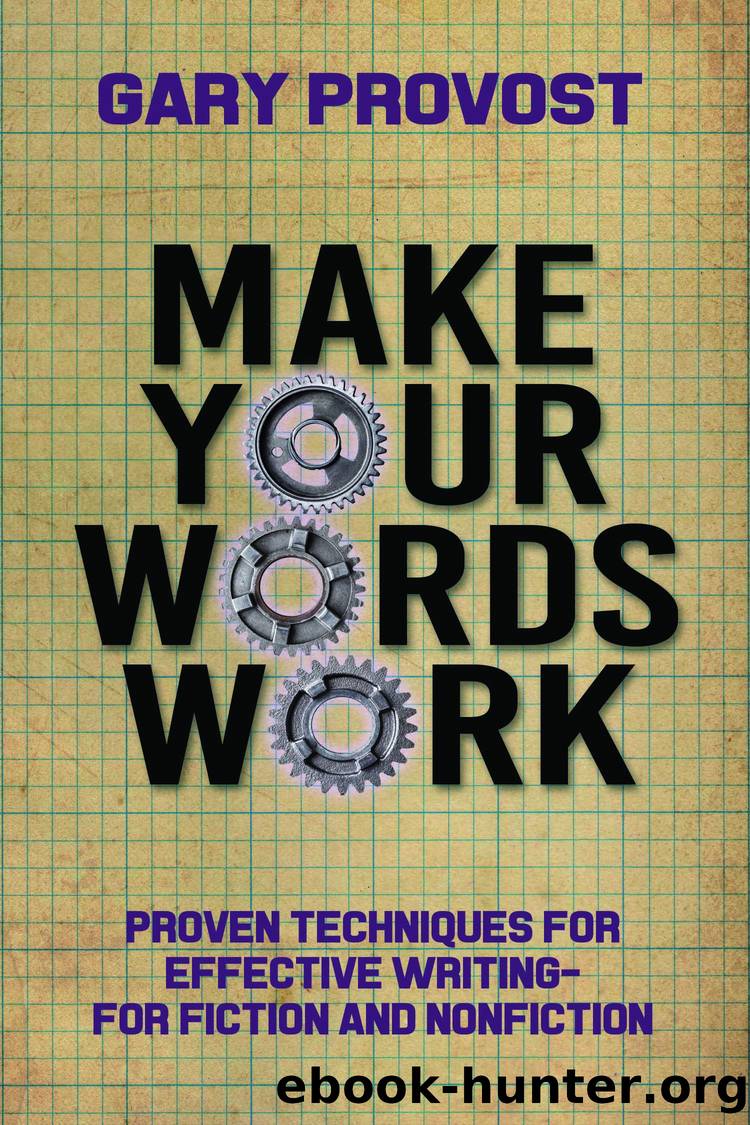Make Your Words Work by Gary Provost

Author:Gary Provost [Provost, Gary]
Language: eng
Format: epub
Tags: writing guide, writing techniques
Publisher: Crossroad Press
Published: 2020-06-07T00:00:00+00:00
Love
Jealous
Regret
Concern
Despair
Sarcasm
Desire
Joy
Annoyance
Rage
Satisfaction
Uncertainty
Curiosity
Determination
Avoid Heavy-Handed Dialogue
The reader gets many facts from dialogue, either because only the speaker knows the facts, or because the writer has concluded that dialogue is the most readable way to provide those facts.
But writing dialogue to provide information must be done with care. If itâs obvious to the reader that dialogue is there only to provide information, he will feel as if heâs been accosted in the middle of reading and told, âJust a minute, Iâve got to tell you some stuff you need to know before you read any further.â This sort of dialogue is called heavy-handed dialogue, and it doesnât work. Heavy-handed dialogue results from characters speaking for the reader when they should be speaking for each other. George tells Joyce things that Joyce obviously already knows, and the reader loses the illusion that the conversation would take place even if he were not there to hear it.
Here are some facts that a writer needs to get across to the reader through dialogue:
A couple is waiting for a new car to be delivered. The car is a Mustang. The day is Saturday. Itâs raining out. Carolyn is the coupleâs daughter. Carolyn was recently in an automobile accident. The husband has to leave for Cincinnati the next day.
What these facts have in common is that the husband and wife already know them and would not ordinarily tell them to each other. But you want to inform the reader of these facts through dialogue, so you have to work them in somehow.
Heavy-handed dialogue would go something like this:
âGee, Joyce, do you suppose our brand-new red Mustang will be here soon? Itâs two oâclock, the time they promised delivery.â
âYes, George, today is Saturday. Another rainy Saturday!â
âI hope it gets here soon.â
âYes, it would be a shame if you didnât get to drive it today, since youâve got to go to Cincinnati on business tomorrow.â
âWell, if it doesnât show up until Monday, you make sure our daughter Carolyn doesnât drive it. I mean, after all, she had an automobile accident just last week.â
Dialogue sounds phony when people tell each other things they already know. But dialogue that delivers information already known by the characters will work if you push the information into the background. Focus the sentences on something else.
âWell, itâs two oâclock. Whereâs the car?â
âIt will be here, George, just settle down. Todayâs Saturdayâtheyâre probably shorthanded.â
âShorthanded, hah! Probably joyriding in my car. Theyâd just better watch the cornering in this rain; I donât want to see a scratch on that car.â
âCornering? For Godâs sake, itâs only a Mustang, itâs not a Maserati.â
âYeah, well, itâs my Mustang, and it looks like Iâm not even going to get to drive it.â
âYouâll drive it, George, youâll drive it. Unless youâre planning to stay in Cincinnati forever. Besides, youâre not even leaving until tomorrow.â
âTheyâre probably picking up broads in it, thatâs what theyâre doing, picking up broads in my car. Look, if it doesnât show up until Monday, you guard it with your life. I donât want Carolyn near it, you understand.
Download
This site does not store any files on its server. We only index and link to content provided by other sites. Please contact the content providers to delete copyright contents if any and email us, we'll remove relevant links or contents immediately.
| Authorship | Bibliographies & Indexes |
| Book Industry |
Asking the Right Questions: A Guide to Critical Thinking by M. Neil Browne & Stuart M. Keeley(5762)
Autoboyography by Christina Lauren(5228)
Eat That Frog! by Brian Tracy(4526)
Dialogue by Robert McKee(4389)
Sticky Fingers by Joe Hagan(4189)
Journeys Out of the Body by Robert Monroe(3619)
Annapurna by Maurice Herzog(3464)
Full Circle by Michael Palin(3443)
Schaum's Quick Guide to Writing Great Short Stories by Margaret Lucke(3376)
Elements of Style 2017 by Richard De A'Morelli(3343)
The Art of Dramatic Writing: Its Basis in the Creative Interpretation of Human Motives by Egri Lajos(3062)
Atlas Obscura by Joshua Foer(2955)
Why I Write by George Orwell(2945)
The Fight by Norman Mailer(2930)
The Diviners by Libba Bray(2927)
In Patagonia by Bruce Chatwin(2922)
The Mental Game of Writing: How to Overcome Obstacles, Stay Creative and Productive, and Free Your Mind for Success by James Scott Bell(2904)
Venice by Jan Morris(2569)
The Elements of Style by William Strunk and E. B. White(2470)
